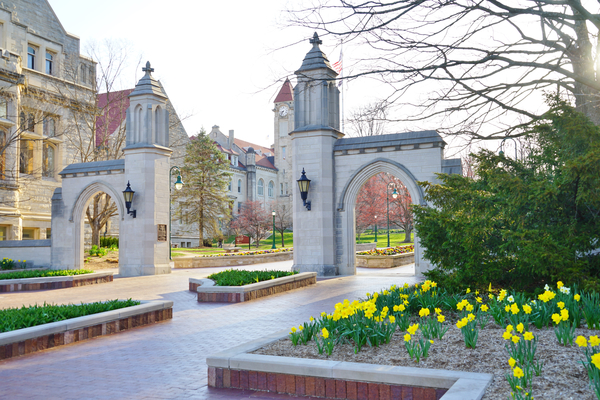IU has faced several troubling antisemitic incidents this school year.
By Dion J. Pierre, The Algemeiner
A “Mezuzah Project” at Indiana University (IU) prompted by a series of antisemitic outrages has seen hundreds of Jewish ritual prayer scrolls distributed across the campus in support, a Jewish community leader said.
“I stand with my Jewish friends,” say the red mezuzahs, recently posted on the doors of the Indiana Memorial Union, a campus landmark and gathering place for students and faculty, according to a school communication Monday.
“The mezuzah is so significant for college students because when they come to campus, it’s the first time they’re creating a Jewish home, the first time they get to make that choice,” IU Hillel Rabbi Sue Silberberg told News at IU Bloomington. “Unfortunately today, it also carries some risk because of antisemitism, so it’s been really meaningful and important to Jewish students to see the mezuzahs on campus.”
This academic year, IU has been the site of several troubling antisemitic incidents. Last semester, six swastikas were graffitied on campus, and during the High Holy Days, at least a dozen mezuzahs were stolen from Jewish students, prompting the creation of the Indiana University Antisemitism Task Force.
Most recently, an anonymous user went on an antisemitic tirade on GreekRank.com that accused Jewish Greek Life members of being “east coast Jews” with an appetite for “money, greed, and sexually assaulting women.”
Supported by the IU Dean of Students, Bias Response Team, and Office of Residential Programs and Services, the task force includes new training programs on the history of Judaism and antisemitism. To help develop the training, IU Hillel offered a resource on Sunday for students to submit an “Antisemitic Experience Testimony.”
Diptanshu Rao, IU junior and president of the Memorial Union Board, which partnered with Hillel for the project, told News at Bloomington that “campus bodies who are in place to represent student interests are not letting antisemitism go unaddressed.”
“We want students to see the mezuzahs and say, ‘Here is a place I can feel comfortable in my identity as a Jew’ and not feel attacked or hated or anything of that sort,” Rao said.
